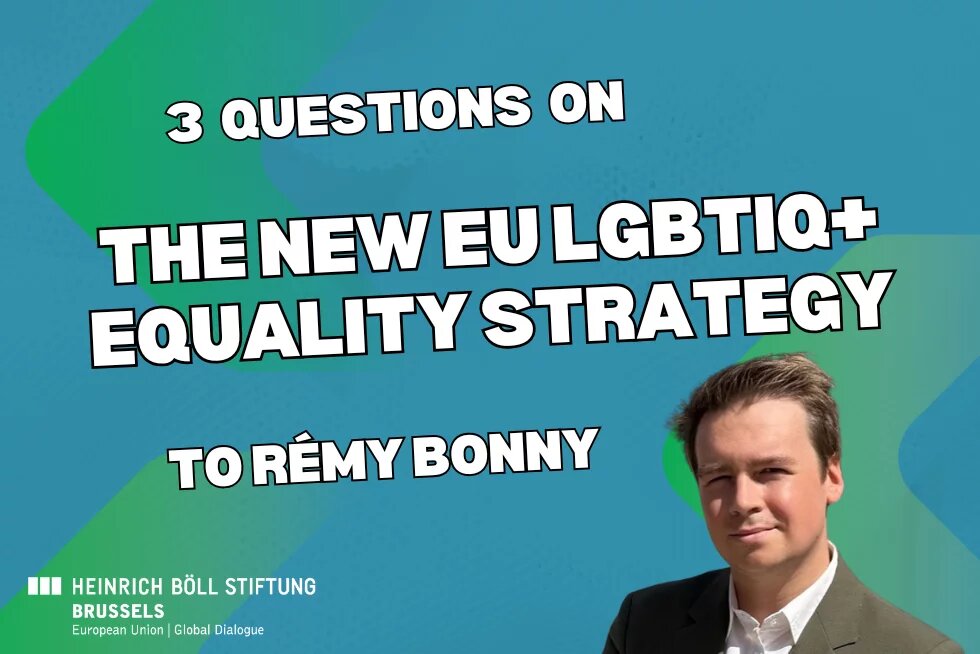The European Commission’s new LGBTIQ+ Equality strategy for 2026-2030 puts equality back on the agenda – but for Rémy Bonny, Executive Director at Forbidden Colours, it comes too little, too late. As Europe faces a coordinated anti-gender movement importing authoritarian narratives into the EU, he warns that “a few nice words won’t stop that.” Joan Lanfranco asked him where the EU needs to show real political courage, how it can counter disinformation and violence, and why defending LGBTIQ+ rights has become a test of Europe’s democracy itself.

1. What is your overall assessment of the new strategy?
The fact that the European Commission is putting the rights of LGBTIQ+ people back on the agenda is welcome, but let’s be honest: this strategy comes too little, too late. Europe is facing a coordinated anti-gender movement that is fundamentally anti-democratic and imports Putin’s authoritarian worldview into the EU through governments like those in Hungary and Slovakia. A few nice words won’t stop that.
While the strategy acknowledges foreign manipulation and interference, it mostly dusts off old initiatives that have failed to deliver impact in the past. The scale of the current threats simply isn’t matched by the scale of the European Commission’s response. This strategy can only be a starting point; what we need is real political courage, funding, and enforcement.
2. Where do you see most urgent EU action to ensure fundamental rights of LGBTIQ+ people, on the ground but also online?
On the ground, the most urgent step is for the European Commission to finally use the legal tools it already has. That means launching infringement procedures against Member States violating EU law, for example Hungary’s Pride ban, Slovakia’s constitutional amendments, and Bulgaria’s propaganda law. These are direct breaches of the Treaties and the Charter, and yet Brussels has remained silent.
Online, foreign information manipulation and disinformation targeting LGBTIQ+ communities is fuelling hatred and undermining democracy. The strategy correctly identifies this threat, but now it needs a proper strategic communications plan and serious investment in the work to counter foreign information manipulation and interference (FIMI). A few paragraphs in a communication won’t protect queer communities from coordinated extremist and foreign-backed online attacks.
I was just last weekend in the Hungarian city Pécs for another banned Pride by the Orbán regime. Far-right hooligans started on several occasions to attack the Pride. People got injured. In this climate of anti-LGBTIQ+ rhetoric, more and more hooligans feel enabled to use violence. This Strategy does not even at all address this.
3. How can the EU translate these ambitions into action, particularly in Member States facing democratic backsliding and the rise of far-right forces?
First, the European Commission must stop hiding behind white papers and start enforcing EU law. Legal action against governments that attack fundamental rights sends a clear message that democracy and equality are non-negotiable.
Second, the EU needs to properly fund the civil society organisations on the frontlines. These groups are often the first to face repression by authoritarian actors, but the last to receive meaningful EU support.
Third, Brussels needs to reframe this issue. Attacks on LGBTIQ+ people are not only equality issues; they are national security and democracy issues. The anti-gender movement is a political weapon, often foreign-backed, to weaken democratic institutions from within. If the EU continues treating this as a niche rights issue, it will keep losing ground to extremists.
The views and opinions in this article do not necessarily reflect those of the Heinrich-Böll-Stiftung European Union.
This article first appeared here: eu.boell.org